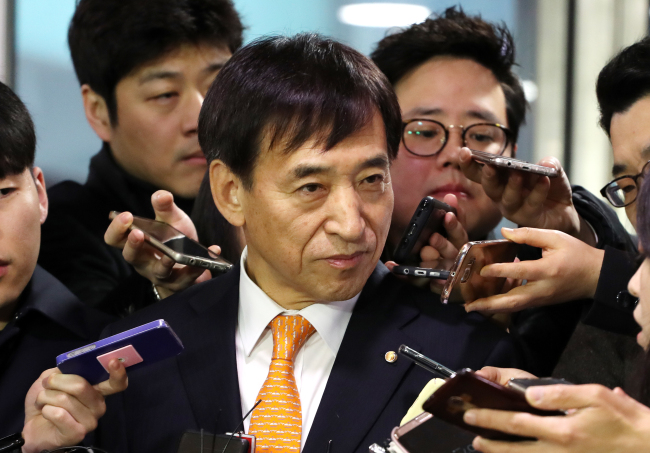The United States’ latest decision to nudge up its key interest rate and the consequent “reversal” of policy rates with South Korea appeared Thursday to have a limited impact on Asia’s fourth-largest economy.
Washington’s signal for the start of a belt-tightening monetary policy over the coming years, however, increased pressure for Seoul’s central bank to consider its own rate hikes despite the tepid economic recovery pace, low inflation and unabated household debts.
“The Federal Open Market Committee’ rate hike conformed with market expectations and had only limited influence on the US financial market, as well as on the South Korean one,” Bank of Korea Gov. Lee Ju-yeol told reporters Thursday on his way to work.
 |
Bank of Korea Gov. Lee Ju-yeol talks to reporters on his way to work Thursday, the day after the US Fed announced a key rate hike. (Yonhap) |
The US central bank on Wednesday raised its policy rate by 25 basis points to 1.5-1.75 percent and forecast at least two more hikes within the year.
Upon the hike, the US policy rate rose above that of South Korea for the first time in 10 years and seven months, kindling concerns of a possible capital outflow here.
Backing the monetary policymaker’s remark, stocks here ended higher Thursday, with the benchmark Kospi closing at 2,496.02, up 11.05 points or 0.44 percent from the previous day.
Lee also expressed confidence of the fundamentals of Seoul’s financial market, citing the newly signed or extended currency swap deals with China, Canada and Switzerland over the past months, as well as the alleviated inter-Korean geopolitical tension.
The BOK chief nevertheless admitted that the Fed’s hike indicated a hawkish turn in the US monetary policy.
“(The policy tone of) the FOMC can be interpreted as being more hawkish (than before),” Lee said.
While vowing to keep a keen watch on the financial markets of both countries, the BOK remained prudent over its own rate hike timeline.
“The time for South Korea’s key rate hike should be decided in consideration of the economic flow and numerous variables,” Lee said, urging caution against speculation that the central bank may lean toward a rate hike as early as within the next two months.
Lee, whose reappointment was approved Wednesday by the National Assembly, is to start his second term in April. His non-pause tenure was deemed a stimulus for the central bank to implement its next rate hiking action.
Anxiety grew further as the FOMC anticipated three additional hikes next year and two more in year 2020, which may raise the US policy rate to a maximum of 3.25-3.5 percent range within the next two years.
Deterring the BOK’s retrenching move is the country’s slower-than-expected economic recovery pace, with its consumer price inflation continuing to idle in the 1 percent range. The nation’s record-high household debts which reached 1,450.9 trillion won ($1.35 trillion) as of last year is another point of concern for mortgage loan borrowers.
The Korea Housing Institute predicted in a report late last year that the anticipated US key rate hike will consequently pull the domestic residential mortgage interest rate to an average of 4.59 percent, which will then increase the interest burden for low-income households to 9.24 percent in maximum.
By Bae Hyun-jung (
tellme@heraldcorp.com)








